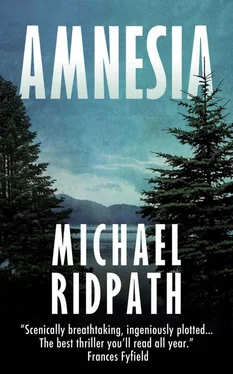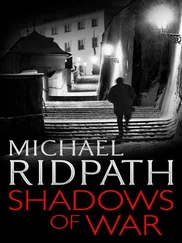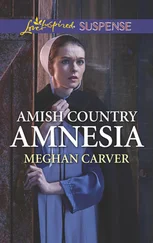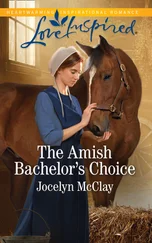When Jerry reached the crag, he was little more than a blurred dab of darkness in the white. And then he was gone.
‘What do we do now?’ hissed Clémence.
‘We move.’
Callum O’Neill hoisted his bike off the train onto the platform, and followed the dozen or so other passengers through the barrier. He paused outside the station to check his route from Dingwall to Loch Glass avoiding the busy A9, and set off. It was twelve miles to the foot of Loch Glass, but Callum was raring to go and looking forward to the ride.
When Clemmie had asked him to join her at the crazy old man’s place he had desperately wanted to say yes. But he had just started at The Feathers and he was nervous about requesting time off right away. Then one of the other barmen had asked Callum if he could switch Tuesday night for Friday, and Callum had spotted his opportunity. He had agreed, provided the other guy would do Wednesday as well, and so had bought himself two nights away. He would have to be back in Glasgow for Thursday lunchtime, but that was just possible if he got up early and caught the first train from Dingwall.
Callum’s immediate instinct was to phone Clemmie and tell her he was coming; she could pick him up from the station in Livvie’s Clio. But then he decided to take up her suggestion of bringing his bike and surprise her. Callum was a keen cyclist, and his dad had an excellent library of maps of the Highlands, so he had worked out that it would be a nice ride from the nearest station.
And it was. It was cool, and the sky was grey, but Callum worked up a sweat. He was soon out of Dingwall, and speeding north parallel to the A-road, with the Cromarty Firth and the Black Isle beyond it. He swooped down into the village of Evanton and turned left up a narrow lane signposted to Loch Glass.
This was harder work, but Callum was fit and his legs pumped, spurred on by the excitement of seeing Clemmie. He really liked her; she was attractive, she was funny and she seemed to like him. Their backgrounds were very different: she was part of the English public school contingent with their gap years and their instilled sense of superiority, and he was younger, Scottish and from a comprehensive. But he didn’t care about that and neither did she.
Besides, both of them were skint.
He was beginning to learn that her outward confidence and sophistication hid a screwed-up, lonely childhood. Callum liked his parents, he liked his younger sister and he still saw all his pals from school, all of which gave him a feeling of security that Clemmie envied.
That was fine with him. Frankly, he couldn’t believe his luck.
He attacked the hill that rose high above the River Glass, and then he was drifting down through the woods to the lodge marked on his map. There he came to a metal gate, with a sign: Wyvis Estate. Private.
He hesitated, wondering whether he should knock on the lodge’s door for permission to pass through. But then he decided he had been invited to the old man’s house by Clemmie, so he had a right to enter the estate. He opened the gate, crossed the river on the wooden bridge, and pedalled through the pine woods to the loch. No one inside the lodge seemed to have noticed him.
As he emerged from the woods, Loch Glass and Ben Wyvis opened up ahead. And an ugly black cloud loomed over both. He put on some speed as the cloud swallowed up the mountain. In a few more minutes snow started to fall.
He reached a turn-off to the left with a sign pointing up the hill into the trees to Culzie, and in another minute he was at a clearing in the woods. There was Livvie’s yellow Clio, with the snow already accumulating on its roof. The snow was falling thickly, as was the visibility. A couple of lights glowed in the cottage, so Callum rested his bike against the wall and, unable to suppress his smile, rang the doorbell.
There was no reply.
Rang again. Nothing.
Damn!
It was snowing hard and there was nowhere else to go, so Callum tried the door handle; it was unlocked and he let himself in.
‘Hello!’ he called. ‘Hello? Clemmie!’
No sign of her, nor of the old man. Livvie’s car was still there, and they had left some lights on in the house, so they might be out somewhere nearby on foot, in which case they would be back soon with the falling snow. Or, more likely, they had gone somewhere in the old man’s car, assuming he had one.
He went through to the kitchen, spotted the kettle and filled it from the tap. That’s what he needed: a cup of tea while he waited.
Jerry stood by the rocks and turned his face into the snow and wind. He couldn’t see more than ten feet ahead of him.
They couldn’t be far away from him. Before the snowstorm had hit, he had had a good view of at least a mile in all directions, and he had seen no sign of them. They had certainly not been on the footpath ahead of him. Which meant they had either disappeared or they were hiding. They weren’t in the rocks by the crag. Perhaps they were in that dip in the ground after all.
He set off into the white, stumbling through heather. After about a minute, he realized he had no idea where that hollow was. He stood still and looked all around him. White silence.
He could get lost in this.
He retraced his footsteps in the snow that was already lying on the heather, until he returned to the footpath. He remembered that there was a small loch ahead and that the path ran around the left edge of it, between the water and the steep slope up to the Ben Wyvis summit. If the old man and the girl were heading for the Ullapool road, then they would have to go along that path.
Head down, Jerry followed the path himself, at a jog. He had no idea how fit Clémence was, but he knew he must be travelling faster than the old man. If he kept up the pace, he should overtake them, probably quite soon.
It was hard work, running through the snow, and he had to keep his head down to avoid twisting an ankle. The flakes driven by the wind bit into his face, but he wasn’t cold, in fact he was building up a sweat. After ten minutes or so, he could just make out black water to his right. He stopped to catch his breath. Jerry was fifty-six himself: no youngster.
What now?
He was pretty sure that his quarry wasn’t just following the path, or he would have caught up with them by now. Which meant they could be anywhere out there in the whiteness. Or the greyness. The light was leaching out of the sky, behind all that snow. It would be dark soon. Jerry would never find them on the mountain.
He thought of continuing on down to the Ullapool road himself. But that was quite a distance. Also, there was a stretch of a mile or two where the old man and the girl might meet it, especially if they weren’t following the paths. Impossible to be sure of intercepting them before they flagged down a car.
No, he was better heading back and regrouping.
So he turned around and trudged down the mountain the way he had come.
The old man led Clémence in what he hoped was a straight line parallel to the mountain path. His plan was to continue until they hit the loch, and then try and work their way around it. The trouble was that in the whiteout it was impossible to be sure that they were, in fact, travelling in a straight line. They had no compass; there was no sun to check. The wind was blowing into his face from a direction just a little right of straight ahead. But the wind could change subtly without him noticing.
It was hard work. Not only was the heather rough, but it was interspersed with mud and peat bog. They both had good coats, with hoods, but neither of them had hats or gloves. The old man had had time to put on his boots, but Clémence was wearing trainers which were soaked through. Worse than that, it would be easy for her to twist an ankle on the uneven ground. They weren’t cold, the going was too tough for that, but the old man was aware he was running low on energy. Also, his stiff knee was beginning to hurt. There was water all around them to drink if they had to, but they had no food.
Читать дальше












